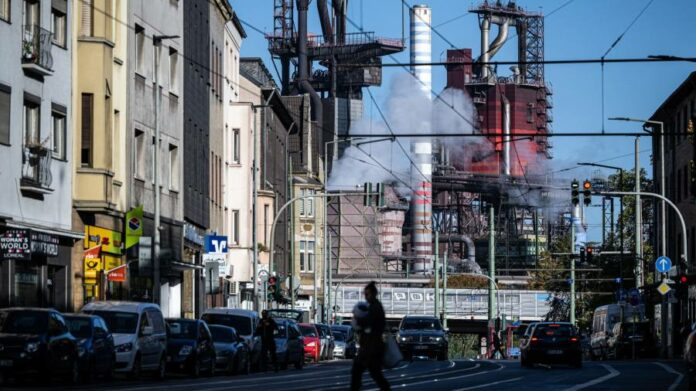Prices charged by German industrial groups at the factory gate fell month on month in October for the first time in more than two years, sparking hopes that consumer inflation in Europe’s largest economy could be close to peaking.
The 4.2 per cent monthly fall in German industrial producer prices, announced by the federal statistical agency on Monday, was due to a sharp drop in wholesale energy costs for businesses that reflects an easing of fears about potential gas rationing this winter.
“While this was largely due to much lower energy prices, today’s figures give cause for hope the inflation rate for consumer prices will also soon reach its peak,” said Ralph Solveen, senior economist at German lender Commerzbank.
“However, this does not mean that the inflation problem is over,” he added, predicting German consumer price growth will peak by next spring “at the latest” and would stay well above the European Central Bank’s 2 per cent target throughout next year.
Germany has been hit by double-digit annual rises in consumer prices for the first time since the early 1950s, after Russia’s invasion of Ukraine and the rebound from the Covid-19 pandemic caused energy and food prices to soar.
However, the recent fall in European wholesale gas and electricity prices mean price pressures in the wider eurozone economy could soon start to ease, even if this is expected to take several months to feed through to the consumer.
Carsten Brzeski, head of macro research at ING, said it would take a few more months for the “pass-through of higher gas prices to consumers” to be completed, adding he expected German inflation to peak in January.
The ECB has raised interest rates by 2 percentage points since July and is expected to raise them again at its meeting next month. Signs that inflationary pressures are easing could persuade policymakers to slow the pace of rate rises.
However, German businesses still plan to pass on more of their cost pressures to consumers, according to a survey of 6,500 companies in October published by the Ifo Institute in Munich on Monday.
Ifo found that companies had passed on 34 per cent of their higher purchase prices to customers in the past few months, but they expected to increase this to 50 per cent by April 2023.
“This is likely to lead to further inflationary pressure on consumer prices,” said Manuel Menkhoff, a researcher at Ifo.
Compared with the same month of the previous year, industrial producer prices in Germany were up 34.5 per cent in October, a much more marked slowdown than economists had expected after 45.8 per cent increases in the previous two months.
Energy producer prices rose 85.6 per cent in the year to October, but compared with the previous month they fell 10.4 per cent, mainly due to lower wholesale electricity and natural gas prices.
Producer prices for other goods, excluding energy, rose at a smaller annual rate of 13.7 per cent in October compared with September while increasing slightly on a month-by-month basis.
German companies are also confronting rising wage demands from workers to offset the rising cost of living, but so far trade unions are settling for pay increases well below inflation, which hit 11.6 per cent in October.
IG Metall, Germany’s biggest union, had demanded 8 per cent pay rises for 3.9mn electric and metal workers, but last week it agreed increases of 5.2 per cent next year and 3.3 per cent in 2024, plus two annual lump-sum payments of €1,500. On Monday, however, the Verdi union submitted a demand for a 15 per cent pay rise for 160,000 Deutsche Post workers.






